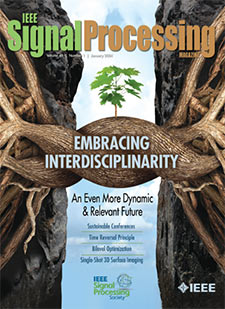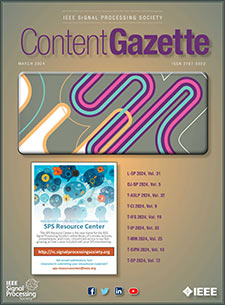- Our Story
- Publications & Resources
- Publications & Resources
- Publications
- IEEE Signal Processing Magazine
- IEEE Journal of Selected Topics in Signal Processing
- IEEE Signal Processing Letters
- IEEE/ACM Transactions on Audio Speech and Language Processing
- IEEE Transactions on Computational Imaging
- IEEE Transactions on Image Processing
- IEEE Transactions on Information Forensics and Security
- IEEE Transactions on Multimedia
- IEEE Transactions on Signal and Information Processing over Networks
- IEEE Transactions on Signal Processing
- IEEE TCI
- IEEE TSIPN
- Data & Challenges
- Submit Manuscript
- Guidelines
- Information for Authors
- Special Issue Deadlines
- Overview Articles
- Top Accessed Articles
- SPS Newsletter
- SigPort
- SPS Resource Center
- Publications Feedback
- Publications FAQ
- Blog
- News
- Dataset Papers
- Conferences & Events
- Community & Involvement
- Professional Development
- For Volunteers
- Information for Authors-OJSP
-
Home
An Exciting Juncture for Signal Processing Research: On Building Bridges, Challenges, and Opportunities
Conferences Events IEEE JSTSP Article IEEE Signal Processing Magazine IEEE TIFS Article IEEE TMM Article IEEE TSP Article Jobs in Signal Processing Lectures Machine Learning Seasonal Schools Signal Processing News SPM Article SPS Distinguished Lectures SPS Newsletter Article SPS Webinar SPS Webinars SPS Webinar Series Webinar webinars -
Our Story
What is Signal Processing?

The technology we use, and even rely on, in our everyday lives –computers, radios, video, cell phones – is enabled by signal processing. Learn More » -
Publications & Resources
-
SPS Resources
- Signal Processing Magazine The premier publication of the society.
- SPS Newsletter Monthly updates in Signal Processing
- SPS Resource Center Online library of tutorials, lectures, and presentations.
- SigPort Online repository for reports, papers, and more.
- SPS Feed The latest news, events, and more from the world of Signal Processing.
-
SPS Resources
-
Conferences & Events
-
Community & Involvement
-
Membership
- Join SPS The IEEE Signal Processing Magazine, Conference, Discounts, Awards, Collaborations, and more!
- Chapter Locator Find your local chapter and connect with fellow industry professionals, academics and students
- Women in Signal Processing Networking and engagement opportunities for women across signal processing disciplines
- Students Scholarships, conference discounts, travel grants, SP Cup, VIP Cup, 5-MICC
- Young Professionals Career development opportunities, networking
- Get Involved
-
Technical Committees
- Applied Signal Processing Systems
- Audio and Acoustic Signal Processing
- Bio Imaging and Signal Processing
- Computational Imaging
- Image Video and Multidimensional Signal Processing
- Information Forensics and Security
- Machine Learning for Signal Processing
- Multimedia Signal Processing
- Sensor Array and Multichannel
- Signal Processing for Communication and Networking
- Signal Processing Theory and Methods
- Speech and Language Processing
- Technical Working Groups
- More TC Resources
-
Membership
-
Professional Development
-
Professional Development
- Mentoring Experiences for Underrepresented Young Researchers (ME-UYR)
- Micro Mentoring Experience Program (MiME)
- Distinguished Lecturer Program
- Distinguished Lecturers
- Distinguished Lecturer Nominations
- Past Lecturers
- Distinguished Industry Speaker Program
- Distinguished Industry Speakers
- Distinguished Industry Speaker Nominations
- Industry Resources
- IEEE Training Materials
- Jobs in Signal Processing: IEEE Job Site
-
Career Resources
- SPS Education Program Educational content in signal processing and related fields.
- Distinguished Lecturer Program Chapters have access to educators and authors in the fields of Signal Processing
- PROGRESS Initiative Promoting diversity in the field of signal processing.
- Job Opportunities Signal Processing and Technical Committee specific job opportunities
- Job Submission Form Employers may submit opportunities in the area of Signal Processing.
-
Professional Development
-
For Volunteers
-
For Board & Committee Members
- Board Agenda/Minutes* Agendas, minutes and supporting documentation for Board and Committee Members
- SPS Directory* Directory of volunteers, society and division directory for Board and Committee Members.
- Membership Development Reports* Insight into the Society’s month-over-month and year-over-year growths and declines for Board and Committee Members
-
For Board & Committee Members
Popular Pages
Today's:
- Submit a Manuscript
- (MLSP 2024) 2024 IEEE International Workshop on Machine Learning for Signal Processing
- Information for Authors
- (SLT 2024) 2024 IEEE Spoken Language Technology Workshop
- IEEE Signal Processing Letters
- SPS Scholarship Program
- IEEE/ACM Transactions on Audio Speech and Language Processing
- IEEE Transactions on Multimedia
- IEEE Transactions on Image Processing
- IEEE Signal Processing Magazine
- IEEE Transactions on Information Forensics and Security
- Conference Call for Papers
- (ACSSC 2024) 2024 Asilomar Conference on Signals, Systems, and Computers
- Signal Processing 101
- Information for Authors-SPL
All time:
- Information for Authors
- Submit a Manuscript
- IEEE Transactions on Image Processing
- 404 Page
- IEEE/ACM Transactions on Audio Speech and Language Processing
- IEEE Transactions on Information Forensics and Security
- IEEE Transactions on Multimedia
- IEEE Signal Processing Letters
- IEEE Transactions on Signal Processing
- Conferences & Events
- IEEE Journal of Selected Topics in Signal Processing
- Information for Authors-SPL
- Conference Call for Papers
- Signal Processing 101
- IEEE Signal Processing Magazine
Last viewed:
- (SLT 2024) 2024 IEEE Spoken Language Technology Workshop
- Learning From the Hidden Letters
- For Volunteers
- A Free Machine Learning Lecture Series on the SPS Resource Center!
- (ACSSC 2024) 2024 Asilomar Conference on Signals, Systems, and Computers
- Overview Articles
- Conferences/Workshops
- AASP TC Home
- IEEE/ACM Transactions on Audio Speech and Language Processing
- (MLSP 2024) 2024 IEEE International Workshop on Machine Learning for Signal Processing
- Guidelines for Associate Editors
- Federated Learning: A signal processing perspective
- SPS Scholarship Program
- IEEE Signal Processing Magazine
- Publications
Kailkhura, Bhavya, Ph.D., Syracuse University, “Distributed inference and learning with Byzantine data” (2017)
You are here
Newsletter Menu
Newsletter Categories
Top Reasons to Join SPS Today!
1. IEEE Signal Processing Magazine
2. Signal Processing Digital Library*
3. Inside Signal Processing Newsletter
4. SPS Resource Center
5. Career advancement & recognition
6. Discounts on conferences and publications
7. Professional networking
8. Communities for students, young professionals, and women
9. Volunteer opportunities
10. Coming soon! PDH/CEU credits
Click here to learn more.
News and Resources for Members of the IEEE Signal Processing Society
Kailkhura, Bhavya, Ph.D., Syracuse University, “Distributed inference and learning with Byzantine data” (2017)
Kailkhura, Bhavya, Ph.D., SYRACUSE UNIVERSITY, “Distributed inference and learning with Byzantine data” (2017) Advisor: Varshney, Pramod K.
We are living in an increasingly networked world with sensing networks of varying shapes and sizes: the network often comprises of several tiny devices (or nodes) communicating with each other via different topologies. To make the problem even more complicated, the nodes in the network can be unreliable due to a variety of reasons: noise, faults and attacks, thus, providing corrupted data. Although the area of statistical inference has been an active area of research in the past, distributed learning and inference in a networked setup with potentially unreliable components has only gained attention recently. The emergence of big and dirty data era demands new distributed learning and inference solutions to tackle the problem of inference with corrupted data.
Distributed inference networks (DINs) consist of a group of networked entities which acquire observations regarding a phenomenon of interest (POI), collaborate with other entities in the network by sharing their inference via different topologies to make a global inference. The central goal of this thesis is to analyze the effect of corrupted (or falsified) data on the inference performance of DINs and design robust strategies to ensure reliable overall performance for several practical network architectures. Specifically, the inference (or learning) process can be that of detection or estimation or classification, and the topology of the system can be parallel, hierarchical or fully decentralized (peer to peer).
First, the authors consider the problem of distributed Bayesian detection in the presence of data falsification (or Byzantine) attacks in the parallel topology. Byzantines considered in this thesis are those nodes that are compromised and reprogrammed by an adversary to transmit false information to a centralized fusion center (FC) to degrade detection performance. The authors show that above a certain fraction of Byzantine attackers in the network, the detection scheme becomes completely incapable (or blind) of utilizing the sensor data for detection. When the fraction of Byzantines is not sufficient to blind the FC, the authors also provide closed form expressions for the optimal attacking strategies for the Byzantines that most degrade the detection performance. Optimal attacking strategies in certain cases have the minimax property and, therefore, the knowledge of these strategies has practical significance and can be used to implement a robust detector at the FC.
In several practical situations, parallel topology cannot be implemented due to limiting factors, such as, the FC being outside the communication range of the nodes and limited energy budget of the nodes. In such scenarios, a multi-hop network is employed, where nodes are organized hierarchically into multiple levels (tree networks). Next, the authors study the problem of distributed inference in tree topologies in the presence of Byzantines under several practical scenarios. The authors analytically characterize the effect of Byzantines on the inference performance of the system. The authors also look at the possible counter-measures from the FC’s perspective to protect the network from these Byzantines. These counter-measures are of two kinds: Byzantine identification schemes and Byzantine tolerant schemes. Using learning based techniques, Byzantine identification schemes are designed that learn the identity of Byzantines in the network and use this information to improve system performance. For scenarios where this is not possible, Byzantine tolerant schemes, which use game theory and error-correcting codes, are developed that tolerate the effect of Byzantines while maintaining a reasonably good inference performance in the network.
Going a step further, the authors also consider scenarios where a centralized FC is not available. In such scenarios, a solution is to employ detection approaches which are based on fully distributed consensus algorithms, where all of the nodes exchange information only with their neighbors.
The above considerations highlight the negative effect of the corrupted data on the inference performance. However, it is possible for a system designer to utilize the corrupted data for network’s benefit. Finally, the authors consider the problem of detecting a high dimensional signal based on compressed measurements with secrecy guarantees. The authors consider a scenario where the network operates in the presence of an eavesdropper who wants to discover the state of the nature being monitored by the system. To keep the data secret from the eavesdropper, the authors propose to use cooperating trustworthy nodes that assist the FC by injecting corrupted data in the system to deceive the eavesdropper. The authors also design the system by determining the optimal values of parameters which maximize the detection performance at the FC while ensuring perfect secrecy at the eavesdropper.
Open Calls
News & Announcements
- Member News: Article by Kush R. Varshney
- Signal Processing Conferences
- IEEE BMC Newsletter – February 2017
- Reminder: 2016 Annual Reporting and Rebate Requirements: Financial Reporting Due 28 February; Meeting and Officer Reporting Due 15 March
- Upcoming Distinguished Lectures
- Call for Proposals: IEEE ICME 2019, 2020, 2021
- Featured News Around IEEE: IEEE Smart Grid Newsletter
- Member News: Steve Chen
- IEEE-USA Offers Free e-Books to Members in January and February
- IEEE Launches New 5G Initiative and Seeks Volunteers
- IEEE Women in Engineering News: WIE ILC 2017, Call for Award Nominations, Scholarship Opportunities
- New Online Submission Process for Geographic Unit Formations
- Give the Gift of IEEE Membership
- Announcing the Latest Innovations for vTools.Events and eNotice
- Member News: Sensors and Sensibility by Vladimir Pavlovic
Initiatives & Trends
Chapter & DL News
Research Opportunities
SPS on Twitter
- DEADLINE EXTENDED: The 2023 IEEE International Workshop on Machine Learning for Signal Processing is now accepting… https://t.co/NLH2u19a3y
- ONE MONTH OUT! We are celebrating the inaugural SPS Day on 2 June, honoring the date the Society was established in… https://t.co/V6Z3wKGK1O
- The new SPS Scholarship Program welcomes applications from students interested in pursuing signal processing educat… https://t.co/0aYPMDSWDj
- CALL FOR PAPERS: The IEEE Journal of Selected Topics in Signal Processing is now seeking submissions for a Special… https://t.co/NPCGrSjQbh
- Test your knowledge of signal processing history with our April trivia! Our 75th anniversary celebration continues:… https://t.co/4xal7voFER
Home | Sitemap | Contact | Accessibility | Nondiscrimination Policy | IEEE Ethics Reporting | IEEE Privacy Policy | Terms | Feedback
© Copyright 2024 IEEE – All rights reserved. Use of this website signifies your agreement to the IEEE Terms and Conditions.
A not-for-profit organization, IEEE is the world's largest technical professional organization dedicated to advancing technology for the benefit of humanity.








